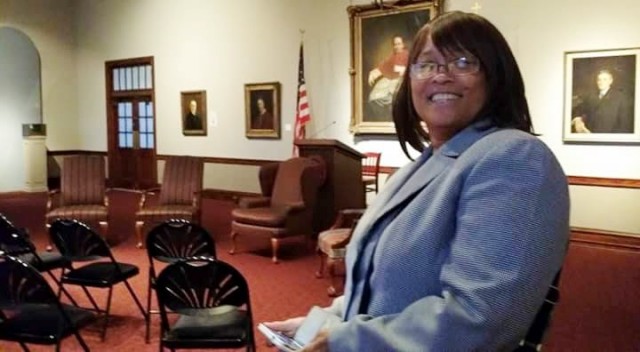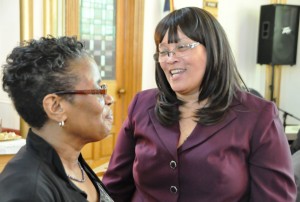“Our lives begin to end the day we become silent about things that matter.”
–The Rev. Martin Luther King, Jr., Civil Rights Leader
Though only 56, United Methodist pastor Myra Maxwell of West Philadelphia can sum up her life’s journey thus far in five simple but stark words: “My misery became my ministry.” Perhaps never have truer words been spoken.
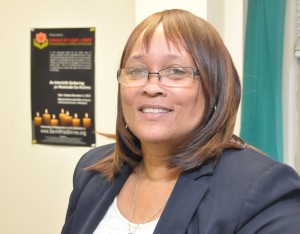 Molested by a family friend from ages 3 to 7, she endured years of suppressed, agonizing shame before becoming a determined, empathetic voice for other victims of abuse and violence. Along the way, she gave her life to Jesus Christ, accepted her call to ministry and learned the power of forgiveness through faith.
Molested by a family friend from ages 3 to 7, she endured years of suppressed, agonizing shame before becoming a determined, empathetic voice for other victims of abuse and violence. Along the way, she gave her life to Jesus Christ, accepted her call to ministry and learned the power of forgiveness through faith.
Those three triumphs over years of turmoil recently led to an improbable encounter when she was selected with four other adult survivors of child sexual abuse to meet privately with Roman Catholic Pope Francis during his September visit to Philadelphia.
“God orchestrated this whole journey,” Maxwell proclaims about her life, “and it has been amazing.”
The sexual abuse ended when her abuser relocated. But shame and guilt prevented her from telling her parents about the ordeal until she was 20, when the “family friend” returned and brazenly asked to take Maxwell’s young daughter shopping.
‘This has been a long journey’
“What he had done was not the kind of thing people talked about freely back then; so he figured I hadn’t told anybody,” she recalls. “But I never forgot about it; I was still living with it. I remember rushing home to protect my daughter, and then I really went after him.” Her vehement reaction stunned her parents and prompted her to finally tell them.
“They were devastated and felt guilty for years after that,” Maxwell recalls. “I don’t think they ever forgave themselves for what happened to me. But I don’t blame them; they didn’t know.”
In fact, blaming herself and her abuser was what she had to stop. “When I saw him years later I realized the only way I could get better was to forgive him,” she says. “That has been a long journey.”
Children who suffer abuse and keep it secret suffer a lot of emotional conflict, Maxwell explained. “My self-esteem was probably at around zero; but nobody knew because I was good at masking the pain in a way that was not healthy for me. … You do it for so long, you never really find out who you are.”
Admittedly, she got caught up in some delinquent behaviors that weren’t healthy for her either, along with a “bad” first marriage that lasted two years. When asked how she finally decided to forgive, her initial answer is simple: “Prayer.”
As a child, she would occasionally attend Camphor Memorial United Methodist Church with her parents. But when a neighbor took her to another church’s Vacation Bible School and they sang the popular children’s song “Yes, Jesus Loves Me,” she was hooked. “That song stuck in my mind,” she recalls, “and after hearing the words, I needed to know who this Jesus was. As I got older, I kept searching.”
For years she attended and became active in various churches, denominational and non-denominational, always searching for herself…and for a savior.
Maxwell became a community outreach worker for a small neighborhood advisory agency about 20 years ago, helping mothers get federal WIC (Women with Infant Children) welfare funds. She instantly became a go-to listener and advocate, especially for victims of domestic violence and intimate partner abuse. “I wondered at times if I had a sign on my forehead that read ‘Talk to Me.'”
When funding for that job was cut, her boss steered her to a victims services agency, where she was hired as a part-time court advocate. She soon became the agency’s program director.
“I was curious why more churches and faith-based groups didn’t have connections with victims services agencies,” she recalls. “So I started trying to make those connections and got interested in ministry at the same time.”
Eventually, she was surprised to discover a call to ministry on her life. So she enrolled in the non-denominational Jameson School of Ministry and after years of study became licensed and ordained.
‘Faith can play a major role in healing’
“Making connections between faith-based groups and victims services agencies became more important to me because as a victim it was my journey to find Jesus that led to my own healing,” she says. “Because of that I realized how important it was to keep faith involved in the work we do with victims. Some folks feel like ‘I don’t want to have anything to do with faith or religion.’ But others say ‘You know what? That’s all I have to lean on.’
“Faith can play a major role in healing because Jesus is a healer, even when he puts people in your path to bring you that healing.”
Having worked for and led victims assistance programs for nearly two decades, her experience has run the gamut “from homicides to purse snatchings and everything in-between.” But Maxwell, who formerly directed victim services at Philadelphia’s Anti-Violence Partnership, eventually felt there must be “more for me to do” beyond just advocacy and intervention.
“I could help people with their basic needs, but there was more to it,” she shared. “I had to reach down deep inside myself to find out what kept me going. It was that song that had stayed with me and never left me. I had to find out why Jesus loved me.”
Remarried and raising five children, she joined an African Methodist Episcopal church, where she found “great preaching and fulfilling worship. But I still needed something more.” Talks with the pastor helped her explore her relationship with Jesus Christ and to hear and finally accept her calling to serve Christ through pastoral ministry.
“I cried a lot, a whole lot,” she remembers. “Why me? I had so many issues and problems from my past. But then I realized that my misery and all that I went through over those years had become my ministry. Every time I met with women and families who were victims I genuinely cared for them and worked to help them through that experience, to get to a place where they could begin to heal.”
For Maxwell, who now works on behalf of children and families at Wordsworth, a Philadelphia community services agency, it’s all about restoration of one’s mind and spirit through holistic ministry. So she started a faith-based nonprofit with that goal in mind, titled Faith and Victims Services Offering Restoration, or FAVOR.
After leading a small non-denominational church for five years, she joined the Eastern PA Conference and was assigned to start a new church, St. Luke’s Restoration Worship Center, in 2010. Now a licensed local pastor, she was assigned in July to lead the merger of that church with historic St. Barnabas-Bethsaida UMC, whose longtime pastor–and her mentor–the Rev. Allen Jenkins Jr., was retiring. Members are still trying to devise a new name for the congregation; but she hopes “Restoration” is a part of it.
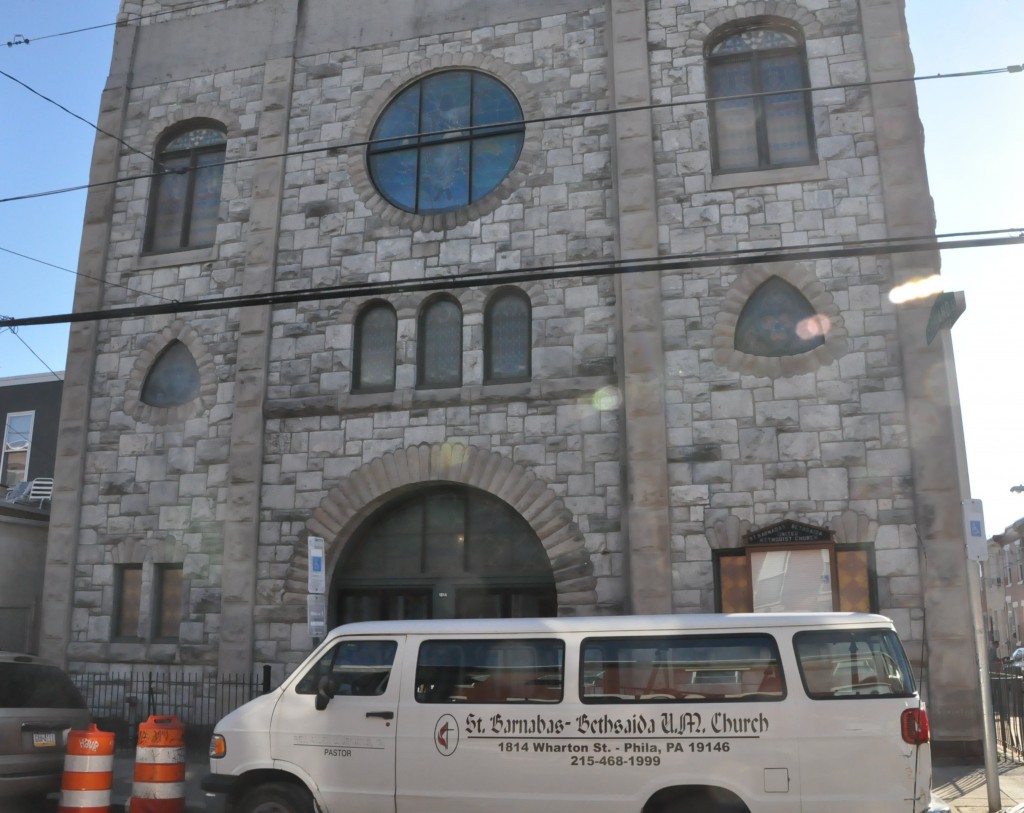
As a coalition leader and advocate for victims, Maxwell is accustomed to telling their stories to promote their cause. But, she says, she rarely gets to tell her own story publicly, except among people with whom she works.
‘For me it’s all about forgiveness’
“I’ve never been shy about sharing it,” says the woman who kept her childhood abuse a secret for 17 years. “I feel it’s important because the people I work with trust you when they realize you’ve been through something and you can be transparent about it.”
When a longtime colleague who works for Philadelphia’s Roman Catholic Archdiocese called to invite her to attend an important meeting she first asked Maxwell to recount her story of struggle and survival again, right then over the telephone.
“I had to close my office door because I get a little emotional when I’m sharing,” she remembers. “I told her that for me, it’s about forgiveness. I had to let go of the weight. I hated this person who hurt me. I hated what he did at first; but then I began to hate him, too. I carried that heavy burden for a long time. I didn’t want him to live anymore, partly out of fear that he may be doing it to someone else.”
That telephone recollection stirred up a lot of painful memories, she said. “But afterward my friend told me the meeting she wanted me to attend would be with Pope Francis. She said, ‘It’s time for your story to be heard. This time is for you.’
“My mouth dropped open,” Maxwell remembers. “I cried. I must have sounded like I was crazy. It’s a good thing I had shut the door.”
Told she could only share the news with her husband, Maxwell asked and was permitted to share it also with her district superintendent, since the scheduled Sunday morning meeting would keep her out of the pulpit and require someone else to preach and lead worship for her that day.
“It was very hush-hush. The media couldn’t know. All of us stayed at a hotel and were picked up that morning and taken to the (St. Charles Borromeo) seminary to meet the Pope.”
The five persons–three women, two men–were survivors of sexual abuse by clergy, teachers and, in Maxwell’s case, a family friend. But she says she was the only clergywoman, person of color and possibly non-Catholic in the group. Each came with a spouse or other companion. The Pontiff had read each of their personal stories in advance.
‘He felt hurt by what happened to us’
“He expressed to us that he was sorry… that our pain was real… and he felt hurt by what had happened to us at the hands of trusted persons,” she recalls. “We were each able to go up and speak to him privately after his statement. I told him I was a United Methodist pastor.”
Pope Francis held her hand gently as she spoke briefly about her journey to forgiveness and healing. “He heard my pain and cared enough to be there for us,” Maxwell recounts with quiet awe. “I know he heard me because when he left us and went into the next room, which was full of bishops, he repeated in his remarks some of what I had said.
“I felt his genuineness in his manner. It was an experience I’ll never forget.”
She knows it was not only her abuse or suffering that led to her invitation, but also her ability to forgive. “It’s easy for other people to tell an abuse victim you’ve got to forgive and move on. But the decision to forgive has to be made by the individual for their own benefit. Some of the horrors these people experience…” She pauses. “Well, my role is to love people through it and let them know the Lord loves them.
She will never forget the pain of not knowing that love. “It affected my life in terrible ways–my relationships with loved ones and other people, and with God. I had flashbacks on bad days. Some days I was so angry with God, I would ask, ‘Why did you let this happen to me?'”
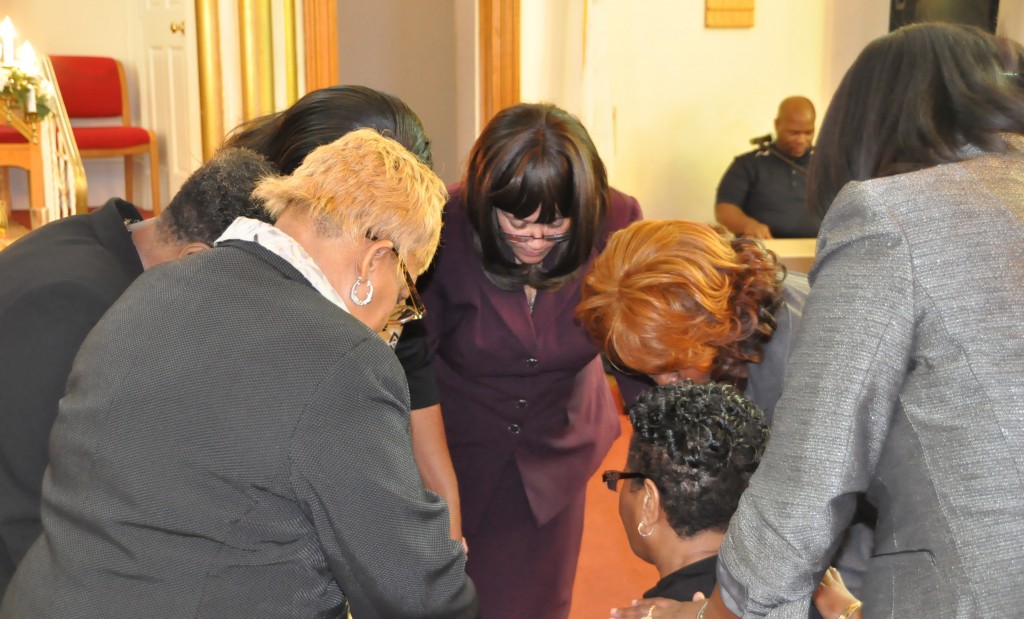
Maxwell (center, standing) prays with women of St. Barnabas-Bethsaida UMC over one of their own, Charlene Carr, who had just preached her first sermon, testifying that, like her pastor, she too is a survivor who has overcome child sexual abuse.
But that awful burden came with a blessing. “It blessed me because God has allowed me to be a voice for other people who need help. I would go to trainings and absorb what they were teaching. Nobody there knew what I had suffered from; but it was a healing process for me. The Spirit just ministered to me. Back then I couldn’t even tell people what was happening inside of me; but when I left, inside I was jumping with excitement at what I was learning.”
As a pastor, Maxwell feels seminaries should require the teaching of effective ministry with victims of crime and abuse, including how to build partnerships with helping agencies. The need is more prevalent than people realize, she says. Her vision includes bringing her message, along with FAVOR ministries, to churches and those they serve around the world.
“My role is telling people, ‘You can be healed through all this if you just give it a chance. Don’t run from Jesus. Run to him.’
“My victims services work is part of my ministry,” she explains. “It will always be that, because I’m touching lives that need to be touched and healed.”
By John W. Coleman
Eastern PA Conference Communications Director
Read Pope Francis’ remarks made to abuse survivors during his meeting with them at St. Charles Borromeo Seminary in Wynnewood, as distributed by the U.S. Conference of Catholic Bishops.

